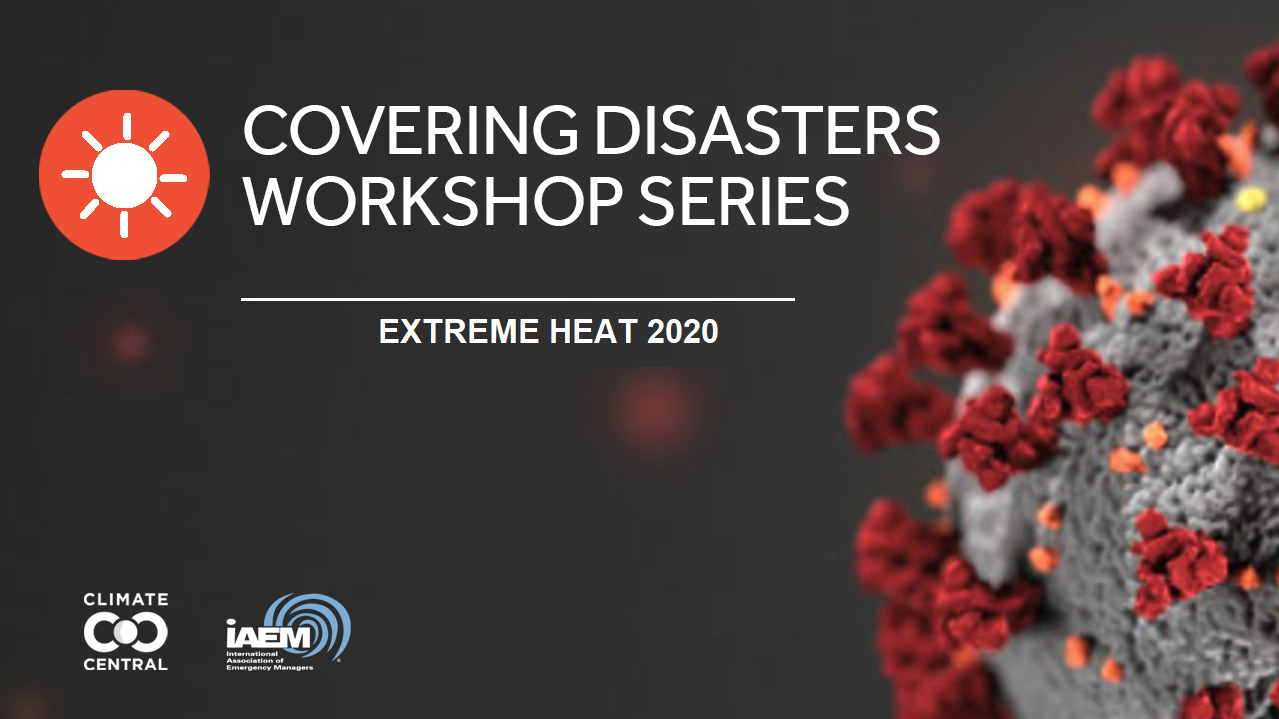JUMP TO:
Climate Central and the International Association of Emergency Managers (IAEM) held an online workshop on June 24, 2020, to prepare journalists and meteorologists for reporting on local emergency planning efforts during extreme heat with particular needs during the pandemic.
Main topics covered by the panel included:
Extreme heat is becoming more routine and severe because of climate change, which is caused by heat-trapping pollution.
Heat is the top weather-related killer, surpassing hurricanes and tornadoes.
A number of cities, like Philadelphia and Phoenix, have implemented life-saving programs, but new challenges have arisen during the pandemic. Philadelphia plans to adapt this year in part by setting hotter thresholds before cooling centers are opened to reduce risks of COVID-19 transmissions.
Cities are frequently much hotter than surrounding countrysides because of the heat-trapping effects of concrete and other building materials. Many of the neighborhoods facing the worst impacts from the urban heat island effect are home to lower-income populations, which are often communities of color, in part because those streets are rarely lined with trees and fewer residents can afford air conditioning.
Veteran reporters talked about how to frame the environmental justice issue when reporting on heat and its consequences, such as by ensuring that a diverse range of voices are included.
PANEL: NATIONAL AND REGIONAL EXPERTS
Iris Hermosillo, Meteorologist, ABC15, Phoenix @IrisABC15
Zeke Hausfather, Climate scientist, Berkeley Earth and contributor to Carbon Brief @hausfath
Derek Ziegler, Deputy Director for Planning, Emergency Management, City of Philadelphia @derekmz
Kristie Ebi, Professor, Environmental and Occupational Health, Global Health, University of Washington @kristie_ebi
Julia Kumari Drapkin, CEO, ISeeChange @juliakumari
Maanvi Singh, West Coast political reporter, The Guardian@maanvisings
Molly Peterson, Reporter, KQED, Los Angeles @Mollydacious
RESOURCES FOR COVERING EXTREME HEAT
Climate Central Resources
A new Climate Central report examines how heat and a warming climate endanger the health of an aging U.S. population, a threat made even more worrisome during the COVID-19 pandemic. Baby boomers will face higher heat threats even as they age into seniors and grow more vulnerable to those threats. Check out the Climate Central Media Library for local, state, and national analysis and graphics on hot weather:
Extreme Heat Index / When Outdoor Sports Become Risky
Other Resources:
The Global Heat Health Information Network has issued a peer-reviewed technical brief and a planning checklist to help communities and health systems prepare for hot weather events during the coronavirus pandemic.
The EPA’s Excessive Heat Events Guidebook highlights best practices that have been employed to save lives during excessive heat events in different urban areas.
The National Integrated Heat Health Information System provides climate and health outlooks, as well as strategies that communities and individuals are taking to mitigate future heat.
The CDC explains the warning signs of heat illness, and provides heat and health risk infographics in English and Spanish.
The 2018 National Climate Assessment lists extreme weather climate change impacts by region of the country, including excessive heat.
Dart Center for Journalism and Trauma at the Columbia Journalism School has a webinar series for journalists reporting on COVID-19. Resources and educational materials include self-care advice and tip sheets for both news managers and reporters covering pandemics.
The Society of Environmental Journalists has a list of resources for journalists covering COVID-19.
The International Association of Emergency Managers has created a page of resources for their members, including webinars and links to national and international health and safety guidance on COVID-19. You can contact their media office to find local emergency managers or experts in your area
ISeeChange has worked on a number of storytelling and citizen science projects on heat and climate, including their partnership with NOAA heat sensor work in Boston, a story on the impacts of heat and climate on people living with disability, and the Harlem Heat Project.
RECENT ARTICLES ON COVID-19 & EXTREME HEAT
Coronavirus Makes Cooling Centers Risky, Just as Scorching Weather Hits, by Christopher Flavelle, New York Times
Will summer kill coronavirus? Cities fear heat waves will quickly become deadly., by Jada Yuan, Tim Craig, and Holly Bailey, Washington Post
A summer heatwave could hurt Boston neighborhoods already suffering from COVID-19, by Julia Hong and Ben Farber, The Scope
'A summer unlike any other': heatwaves and Covid-19 are a deadly combination, by Maanvi Singh, The Guardian
